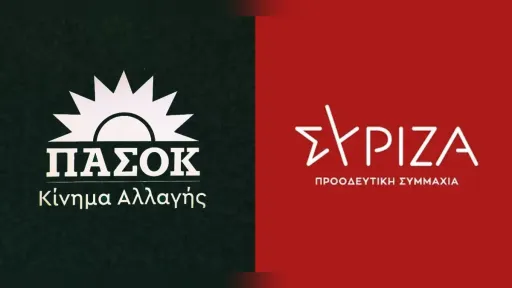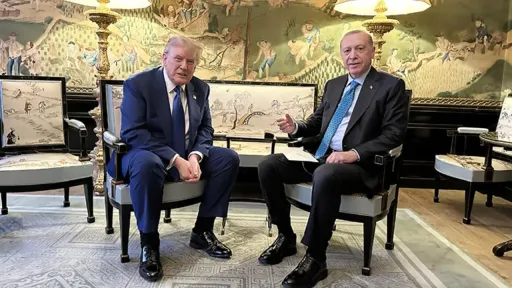Türkiye's growing influence in Europe disturbs Greece

Despite a push for rapprochement, Athens displays increasing unease with Ankara’s growing diplomatic influence in Europe and potential to join the EU’s new security mechanism, as the Greek defense chief seemingly warns the bloc against Türkiye’s inclusion in SAFE.
Greece is increasingly disturbed by its historical archrival Türkiye’s growing influence in Europe and the EU’s ambitious plans to strengthen its security mechanism.
Although Türkiye and Greece pursue rapprochement in their formerly hostile relations, Athens also works to bolster its defenses by new acquisitions, while Türkiye’s flourishing defense industry raises its profile, especially with sales of uncrewed aerial vehicles (UCAVs) to other countries and boosting its military arsenal with locally-made products.
Ankara and Athens are particularly at odds on their maritime borders in the Aegean Sea, which has been the venue for dogfights between Turkish and Greek fighter jets in the past.
In an interview with the Greek daily “Naftemporiki” last Friday, Greece’s Defense Minister Nikos Dendias made pointed remarks about Türkiye’s pursuit to join the EU’s Security Action for Europe (SAFE) program.
“The partners must decide what kind of Europe they want. No, Europe is without principles, values and respect for the rules of international law. It is also unthinkable that countries that threaten EU member states or do not recognize EU members should indiscriminately participate in the project of rearming Europe,” Dendias told Naftemporiki.
EU countries have adopted a regulation last month setting up SAFE, a new financial instrument designed to support member states that wish to invest in defense industrial production through common procurement, focusing on priority capabilities.
Under the approved part of the regulation, joint defense procurement of the bloc may include third countries not members of the EU, such as Türkiye.
Europe aims to reinforce its defenses as the United States reconsiders its generous support to the continent’s defense since World War II. Türkiye is eager to contribute to Europe’s security architecture, although the bloc stalled its accession for years.
Regarding Greek-Turkish relations, Dendias was also adamantly unoptimistic about the mutual push for rapprochement in the past two years.
“Regarding the ‘good atmosphere,’ I would like to underline that this narrative that Türkiye may be using cannot be considered credible,” he said, repeating a point he often raises to undermine what Ankara and Athens have called a “new phase” in historically strained ties.
The Greek defense chief further criticized Türkiye’s “Blue Homeland” doctrine, a maritime strategy introduced by Turkish naval officers in 2006 and later adopted by the government, calling it “revisionist.”
The doctrine aims to expand Türkiye’s control over surrounding waters and maritime resources, which has been a source of disputes with Greece in the Aegean and Eastern Mediterranean.
‘Barrack the Turkish agent’
Greek media, too, has added fuel to the fire, even accusing the U.S. Ambassador to Ankara, Thomas Barrack, of being a “Turkish agent” for “acting in favor of Türkiye.”
“The U.S.’ pro-Türkiye Ambassador Tom Barrack has officially become an agent for Türkiye. Instead of serving American strategic interests, he’s serving Turkish interests,” Greek magazine Hellas Journal wrote.
The journal said Barrack "secretly" traveled to Washington and met with President Donald Trump and Secretary of State Marco Rubio at the Oval Office last Friday.
“I spent my afternoon with President Trump and Secretary of State Rubio at the White House. We discussed Middle East issues related to Türkiye and Syria. I can assure you that the President’s vision, with the Secretary’s implementation, is not only promising but also doable,” Barrack reportedly wrote on X following the meeting.
"We do not know exactly what Mr. Barrack meant, but according to diplomatic sources, it is certain that he advanced the Turkish agenda in the White House,” Hellas Journal said.
The journal claimed the U.S. ambassador is “racing against time to make President Recep Tayyip Erdoğan’s visit to Washington happen.”
According to Hellas Journal, Barrack is working to ensure Erdoğan returns from a trip to Washington with “many gifts,” most notably the lifting of sanctions under the Countering America's Adversaries Through Sanctions Act (CAATSA) on the Turkish defense industry.
Touting Trump’s “more open, more constructive” approach, Erdoğan last month said he believes the CAATSA sanctions would soon be “overcome.”
Erdoğan said he had discussed the matter with Trump and Washington's new ambassador to Ankara.
"With my friend Trump taking office, we reached a more open, more constructive, more sincere communication," he said.
The move, if implemented, could see Türkiye purchase at least $20 billion in U.S. military equipment, which could increase Ankara’s naval capabilities, notably in the Aegean Sea.
DailySabah







